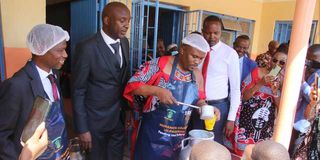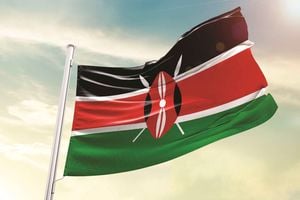
The Kingdom of Eswatini's Minister for Tinkhundla Administration and Development, S'Khumbuzo Dlamini, serves porridge to pupils of Vidhu Ramji ECD Centre in Murang'a town on May 16, 2024, as Governor Irungu Kang'ata looks on during the launch of the Uji Programme for ECDs in the county.
We are going to see more of the dangerous daring side of life here," said an American philosopher John Dewey in 1919 in China.
He was celebrating the learning by doing and social experimentation of China. This practice subsequently became Chinese most important governance practice over the next course of years.
When Deng Xiaping assumed leadership of the country in late 1970's and initiated the new "opening up" policy of the economy, he would begin through experimentation. He would choose a certain select city and observe results before extending the opening up policy elsewhere.
New policy initiatives can go wrong. Leaders should be magnanimous enough to drop them. There is nothing intrinsically good. What matters is a policy practical effect.
Those that work conversely should be extended beyond the pilot area. The national government has proposed several new policy directions.
The pilot period of each programme would differ per each policy.
When Muranga decided to introduce free and daily school feeding programme for it's 42,000 early childhood learners, many probable problems were spotted after a three-month initial pilot was conducted in select schools.
The cost of such a large intervention was high. Cost elements included the probable number of kitchens for the programme, noting the county has about 700 early childhood educational schools. It also involved the number of cooks and availability of such humongous amounts of energy, utilities like water availability and keeping high hygiene standards.
To reduce these probable costs, an idea of aggregation of kitchens was mooted. The issue of hygiene upon transportation became important. And staff to wash utensils noting granting this role to teachers would be disruptive. To remedy this, it was decided parents elect amongst themselves a food champion who would check hygiene and wash utensils.
Various stakeholders including parents and politicians had to be trained constantly to allay fears of the programme.
Ultimately, the pilot succeeded after these initial challenges.
Piloting of hospital automation was done in the county's singular Level 5 hospital before automation rolling out into all 157 medical facilities. The pilot uncovered potential challenges of human resources IT skills, constant power disruptions and hardware gaps. These challenges made the county to invest in trainings and solar power to attempt maintain constant power.
Some pilots go south. The county's maternal and mortality rates were not in the positive directions as some mothers tended to give birth at home. Thus to incentivise attendance of natal clinics and hospital deliveries, the county initiated a transportation reimbursement program. The media misinterpreted the idea by broadcasting falsely the county wanted to increase it's population. The portal created to capture the expectant mothers had erroneous information.
The county had to pause and adopt a physical verification exercise that produced accurate data.
The initial design of county subsidy program for milk and mango was to send support directly to farmers based on their productivity. Feedback after one year made the county remodel the idea into e-vouchers system that proved more impactful as they equalised support. Technology rendered the intervention objective.
Ironically this was what the policy and regulations that underpinned the programme had envisaged.
Currently the county is undertaking two pilots. The first is the idea of upscaling school feeding food into primary schools. The few schools that host county kitchens are benefiting noting parents co-pay Sh20 per dish. Results so far seem to suggest Sh300m would be required annually to extend the idea to all 200,000 primary school pupils.
The second idea being piloted is telemedicine in 38 health facilities. It commences in early September.
The national government also historically does piloting in several instances. One programme it could be encouraged to consider piloting before universal rolling out is the new universities financing model.
One Musician brought to fore an important English saying- If at first, you do not succeed, try again and again. Time will bring, your lucky number.
Dr Irungu Kang'ata is the Governor of Murang'a County. Email: [email protected]










